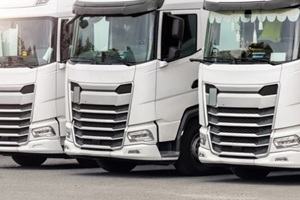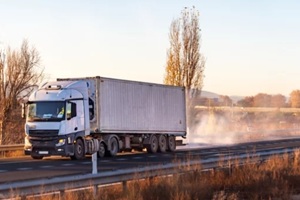
Commercial vehicle operation is a complex process for businesses of all sizes. Transporting goods comes with financial and legal risks. Comprehensive trucking insurance allows businesses to mitigate these risks and protect their high-value cargo. Commercial cargo insurance is also required to maintain legal operations in most states.
Below, we describe key steps businesses can take to choose complete trucking insurance solutions that meet their needs. Just as you would hire qualified drivers and deploy safely maintained vehicles, your trucking business should maintain adequate insurance to protect your high-value cargo.
Types of Commercial Trucking Insurance
According to the FMCSA, companies that operate commercial vehicles must maintain adequate insurance coverage. As businesses seek thorough insurance solutions, they need to understand the difference between four general types of policies:
- General Liability Insurance: This type of coverage protects businesses when their drivers are involved in a crash that results in bodily injury or property damage. Additional coverage may be needed to cover accidents at loading docks or stops.
- Physical Damage Insurance: Physical damage coverage protects vehicles from common types of damage caused by theft, vandalism, weather, and more. This coverage also pays for replacements if vehicles are damaged beyond repair.
- Bobtail Insurance: Bobtail insurance covers vehicles in situations outside of normal operations, which general liability policies do not cover.
- Cargo Insurance: While general liability protects vehicles, cargo insurance covers freight from various costs, including cargo damage, cargo loss, loading accidents, and cleanup. Cargo insurance is necessary for businesses to protect their shipments, especially those involving high-value or special kinds of cargo.
What is High-Value Cargo Insurance?
An effective trucking insurance policy combines multiple types of coverage into one sweeping solution. While cargo insurance protects general freight from damage, high-value cargo requires separate coverage.
What is defined as “high-value cargo?” The answer often depends on each state’s legal liability minimums. However, for this article, high-value cargo can be defined as:
- Cargo with value that exceeds the minimum liability requirements for trucking businesses in that state
- Cargo that is deemed irreplaceable, such as an art collection
- Cargo that consists of items with a high market value, such as unappraised jewelry, precious metals, expensive electronics, pharmaceuticals, and more
- Cargo that consists of sensitive documents or physical cash
Importantly, the value of cargo for insurance purposes relies on an accurate appraisal process. Before transporting high-value goods, trucking businesses should follow these steps to make sure they have adequate cargo insurance:
1. Cargo Valuation

Accurately evaluating your business’s cargo is the first crucial step to finding the right insurance policy. While underestimating the value of the cargo can lead to costly coverage gaps, overestimating its value can lead business owners to overpay for their cargo insurance.
Professional valuation makes sure that the cargo insurance policy your business pays for matches the value it needs to protect. A professional firm can help your business accurately appraise your high-value freight to find the right insurance premiums for your needs.
2. Policy Assessment
In addition to cargo valuation, commercial trucking businesses should conduct regular policy assessments to make sure they understand the scope of their coverage. Specific terms in your business’s insurance policy could exclude certain types of damage or set liability limits on cargo, leading to costly coverage gaps in the event of a high-value loss.
3. Risk Assessment
Conducting regular risk assessments allows commercial trucking owners to understand their coverage needs. This includes assessing the security measures at unloading points, the hazards and traffic on regular transport routes, and the risks associated with the specific vehicles and cargo the business uses.
Thorough risk assessments help businesses match the policy to the cargo. Hazardous chemicals and art collections may both be considered high-value cargo, but they will not be insured in the same way.
4. Training Measures
Business owners should factor security and employee training into their assessments when evaluating their needs for high-value cargo insurance. Greater security measures, such as theft deterrents and surveillance systems, may convince insurers to offer lower premiums for high-value cargo insurance policies.
Employee security training is another way commercial trucking owners can negotiate lower premiums with insurers. Training programs for safely handling high-value goods, operating vehicles, and responding to security incidents can reduce the risk of cargo loss and make your business a more attractive investment to insurance providers.
5. Insurer Selection
Selecting the right provider for high-value cargo insurance can be difficult. Commercial trucking owners should look for firms with experience insuring high-value cargo and a record of success handling claims on high-value losses. If your business transports cargo across state or international lines, an insurance firm with experience navigating these areas can be extremely beneficial.
Contact an Experienced Firm for Comprehensive Trucking Insurance

Commercial trucking business owners require complete insurance solutions that cover damage and loss to high-value cargo. This requires accurate valuations of their cargo’s value, as well as regular policy assessments that identify coverage gaps in their current policies.
At Pro Insurance Group, our team is dedicated to helping commercial trucking owners find comprehensive insurance policies that protect their high-value cargo. Contact our team today to learn how we can assess your business’s needs and customize a high-value cargo policy that makes the most sense in your situation.
